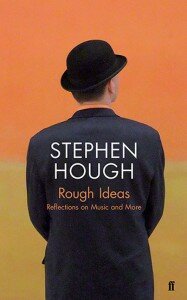The title is a play on his name and the collection of essays in this satisfyingly chunky volume were often “roughed out” by Stephen Hough while travelling between concert engagements, If you think the life of the international concert pianist is glamorous, think again – in between rehearsals and concerts much time is spent at airports, on planes or in faceless continental hotels; for Hough writing was a way of filling that dead time.

Cover of Rough Ideas
The word “polymath” is nearly always uttered in the same breath as “Stephen Hough” – concert pianist, composer, writer, artist, teacher, thinker – but Hough wears the title lightly. Articulate and highly communicative on and off the concert stage, he is charming and natural when you meet him after a concert, and his lively Twitter presence reveals a penchant for the good things in life – fine food, perfume, hats – combined with an intelligent, open-minded approach to the challenges of our modern world. While other internationally-renowned concert artists may hide behind their reputation, Hough is happy to engage with his audiences, online and in person, and this warm-hearted, genuine approach, alongside his thoughtful suggestions on changing the format of concerts, for example, has helped break down some of the barriers and misconceptions surrounding classical music.
Hough: Piano Sonata, “Broken Branches”
As befits a Living Polymath, Hough’s writing net casts wide, and while the bulk of the volume focuses on musicians and music – the exigencies of being a professional musician, the piano and those who play it, concerts (giving and going to them) – there are also engaging articles on art and culture, and more challenging and philosophical reflections on religion and the difficulties of being a gay Catholic.

Stephen Hough
Most musicians communicate best via their music, but Hough, himself a deeply communicative and intellectually acute pianist, is also an eloquent and intelligent writer, whose words are as carefully crafted and colourfully nuanced as his playing, and the phrasing, cadence and pacing of his writing pleasingly mirrors musical shaping.
Hough illuminates the pleasures and challenges of being a concert pianist and offers readers an intriguing view “beyond the notes” and the concert stage into this sometimes masochistic, often lonely profession, while never quite dispelling the mystique of the professional musician. There are thoughts on those sacred, church-like spaces where music is performed and heard (a lovely appreciation of London’s Wigmore Hall opens the book), ageing audiences (be kind to them – they populate and support concerts), dealing with creative block and performance anxiety, page-turners, the joy of making mistakes, and what happens when musicians “lose it” on stage (in this instance, a fit of hysterical laughter with cellist Steven Isserlis).
In the section entitled Studio, he discusses the musician’s “tools” – practicing, fingering schemes, scores, trills, pedalling and more – sharing his wisdom and offering encouragement and inspiration to pianists, whether amateur or professional. Later sections ‘…and More’, ‘…and Religion’ reveal Hough as a profound thinker, always curious and questioning, never accepting nor complacent, and the entire volume is a wonderful insight into the mind of one of our greatest living pianists and a significant cultural figure in his own right.
This generous, varied compendium is intriguing, engaging and thought-provoking, always readable and elegantly written. Dip in and out of the chapters or read from start to finish, Rough Ideas is an ideal volume for the serious musician or keen amateur, music lovers in general, and anyone who enjoys well-crafted, intelligent prose on a broad range of subjects.
Rough Ideas is published on 1 August by Faber & Faber in hardback and e-book editions




Wonderful, sensitive, dynamic in performance, pianist… will get his book…
Please forgive me Stephen Hough for having your name written on card on my piano, spelt,
‘ Huff’. !
Thankyou for the music
Mary Kinneavy 🔸